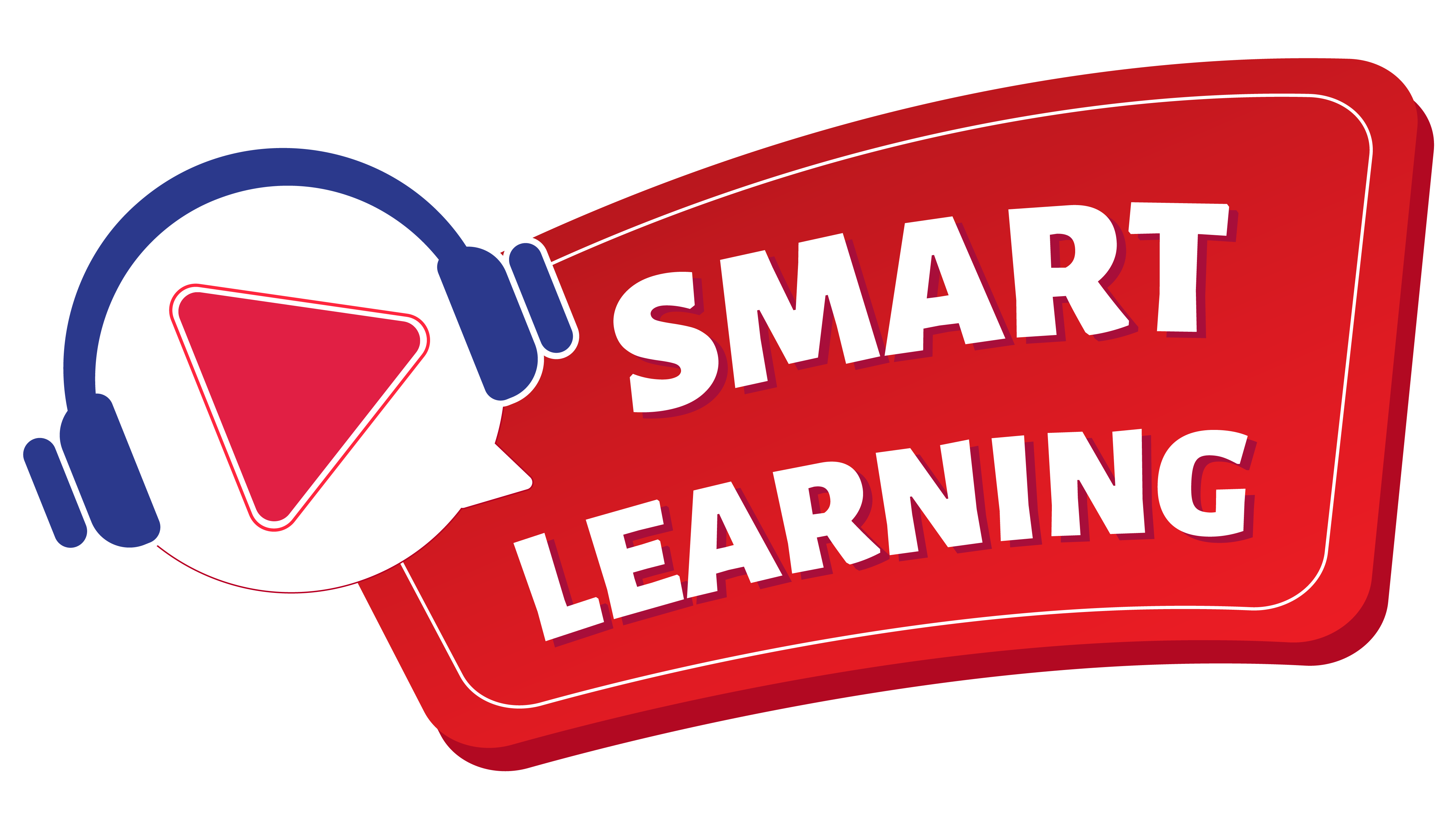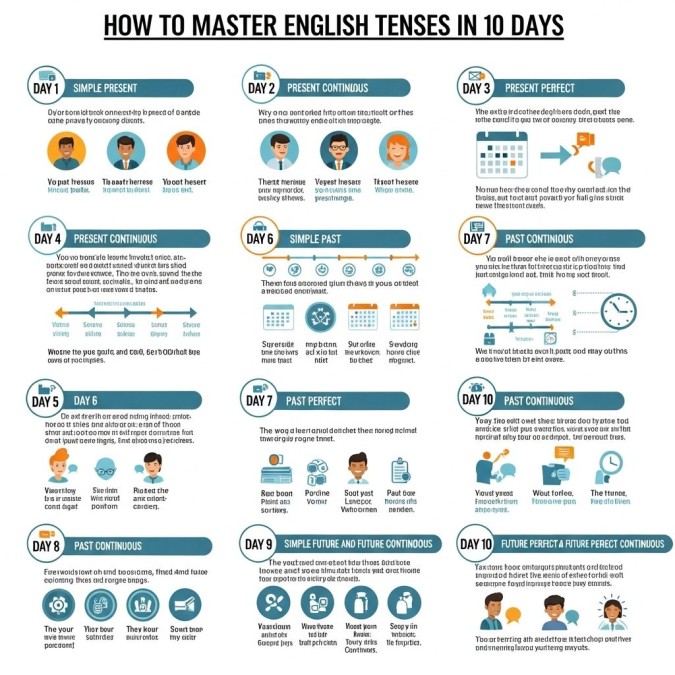🧠 How to Master English Tenses in 10 Days
A Smart Learning Guide for Teens Who Want Real Results
✨ Section 1: Why Tenses Matter More Than You Think
If you’ve ever said something like “I go to the mall yesterday” and gotten a confused look, you’ve already met the power of tenses. English tenses aren’t just grammar—they’re time machines. They tell your listener when something happened, how long it lasted, and whether it’s still happening. Without them, your story loses its shape.
But here’s the good news: mastering tenses doesn’t mean memorizing hundreds of rules. It means understanding patterns, contexts, and triggers. And with Smart Learning’s 10-day challenge, you’ll go from guessing to confidently expressing yourself—whether you’re writing a school essay, chatting online, or preparing for an exam.
🔍 What Are Tenses, Really?
Tenses are verb forms that show time. In English, we use three main time frames:
- Past – What already happened
- Present – What’s happening now
- Future – What will happen later
Each time frame has four aspects:
| Aspect | Meaning | Example |
|---|---|---|
| Simple | A basic fact or event | I eat lunch. |
| Continuous | An action in progress | I am eating lunch. |
| Perfect | A completed action | I have eaten lunch. |
| Perfect Continuous | An action that continued over time | I have been eating lunch. |
Multiply those together and you get 12 tenses. Sounds scary? Don’t worry—we’ll break them down day by day.
🚀 Section 2: The 10-Day Tense Mastery Plan
Here’s your Smart Learning roadmap. Each day focuses on one or two tenses, with examples, triggers, and practice tips. You’ll build confidence step by step.
📅 Day 1: Present Simple & Present Continuous
- Present Simple: Used for facts, routines, and general truths.
I play football every Saturday. - Present Continuous: Used for actions happening now.
I am playing football right now.
🧠 Trigger Words: always, usually, now, currently
🎯 Practice Tip: Describe your daily routine in both tenses.
📅 Day 2: Past Simple & Past Continuous
- Past Simple: Used for completed actions in the past.
I watched a movie yesterday. - Past Continuous: Used for actions in progress at a specific time in the past.
I was watching a movie when you called.
🧠 Trigger Words: yesterday, last week, while, when
🎯 Practice Tip: Write a short story about your weekend.
📅 Day 3: Future Simple & Future Continuous
- Future Simple: Used for decisions, predictions, and promises.
I will study tonight. - Future Continuous: Used for actions that will be in progress at a future time.
I will be studying at 8 PM.
🧠 Trigger Words: tomorrow, next week, later
🎯 Practice Tip: Make a schedule for your next 3 days using both tenses.
📅 Day 4: Present Perfect
- Present Perfect: Used for actions that happened at an unspecified time or still affect the present.
I have finished my homework.
🧠 Trigger Words: already, yet, ever, never, just
🎯 Practice Tip: List 5 things you’ve done this week.
📅 Day 5: Past Perfect
- Past Perfect: Used for actions that happened before another past action.
I had finished dinner before the movie started.
🧠 Trigger Words: before, after, by the time
🎯 Practice Tip: Write a two-part story using “had + verb.”
📅 Day 6: Future Perfect
- Future Perfect: Used for actions that will be completed before a future time.
I will have finished my project by Friday.
🧠 Trigger Words: by, before, by the time
🎯 Practice Tip: Predict 3 things you’ll complete this week.
📅 Day 7: Present Perfect Continuous
- Present Perfect Continuous: Used for actions that started in the past and are still happening.
I have been studying for 2 hours.
🧠 Trigger Words: for, since, all day
🎯 Practice Tip: Describe something you’ve been doing lately.
📅 Day 8: Past Perfect Continuous
- Past Perfect Continuous: Used for actions that were ongoing before another past event.
I had been waiting for 30 minutes before the bus arrived.
🧠 Trigger Words: for, since, before
🎯 Practice Tip: Write a story with two overlapping actions.
📅 Day 9: Future Perfect Continuous
- Future Perfect Continuous: Used for actions that will be ongoing until a future point.
I will have been working for 5 hours by noon.
🧠 Trigger Words: for, by, until
🎯 Practice Tip: Predict your future study habits.
📅 Day 10: Review & Combine
Now that you’ve explored all 12 tenses, it’s time to mix and match. Create a short story that uses at least 6 different tenses. Use color coding or emojis to highlight each one.
🎯 Challenge: Record yourself reading the story aloud. Listen for tense shifts and clarity.
🌟 Section 3: Smart Learning Tools to Make It Stick
Mastering tenses isn’t just about reading—it’s about doing. That’s where Smart Learning comes in. Here’s how to supercharge your 10-day journey:
📚 Interactive Lessons
Each tense comes with bite-sized lessons, animated examples, and Thai-English explanations. You’ll never feel lost in translation.
🧩 Practice Quizzes
Gamified quizzes help you test your understanding. Get instant feedback and retry until you nail it.
🎙️ Speaking Challenges
Use voice input to practice tense-based sentences. Smart Learning gives you pronunciation tips and fluency scores.
📝 Writing Prompts
Daily writing challenges help you apply each tense in real-life scenarios—from journaling to storytelling.
📈 Progress Tracker
See your mastery grow day by day. Earn badges, unlock rewards, and share your progress with friends.
💬 Final Thoughts
Tenses are the backbone of English communication. Once you master them, everything else becomes easier—speaking, writing, listening, even thinking in English. With Smart Learning’s 10-day plan, you’re not just memorizing rules—you’re building fluency, confidence, and a lifelong skill.
So grab your kit, open your dashboard, and start Day 1. Your English future starts now.



